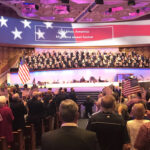
Site Settingshttp://www.rightingamerica.net (Previously posted at www.rightingamerica.net)
Our nation stands at the crossroads of nihilism and neighborliness. In service to the present, history always stands ready to guide us in haphazard times.
The “good neighbor” policy of President Franklin Delano Roosevelt contrasts sharply with President Donald Trump’s “You are my enemy” policy. Roosevelt’s policy, rooted in a biblical concept of the goodness of humanity shines in the darkness of Trump’s nihilism.
Before I continue with my comparison of Roosevelt to Trump, I must make a few historical disclaimers concerning Roosevelt’s “Good Neighbor” policy. Roosevelt’s “Good Neighbor” policy had its limits, as Roosevelt, the consummate politician, was too pragmatic to literally make literal the politics of Jesus. Unlike MAGA evangelicals insistent cry of President Trump as “God’s chosen one,” Roosevelt was at heart a master politician with a shrewd understanding of pragmatism.
At times he acted more like “Big Brother” than good neighbor. Roosevelt’s vision of a national neighborhood allowed him to accrue power in the federal government and in the office of the presidency. Moreover, in his New Deal programs, Roosevelt often appointed the most fiscally conservative directors he knew would keep spending at a reasonable level. His pragmatism shows him as less than a national “Good Samaritan” neighbor.
He also underwrote the instantiation of democratic global ideological hegemony under the guidance of a strong United States.
Moreover, Roosevelt’s hierarchies reveal the contours and limits of his neighborhood. His neighborhood didn’t include advances in Civil Rights. African American homes were more likely to have photographs of Eleanor than Franklin in their living rooms, and for good reason. And it was Roosevelt who authorized the notorious internment of Japanese-Americans during World War II.
All this said, I would contend FDR’s “good neighbor” policy comes closer than any other attempt to bring about the kingdom of Jesus summarized in Jubilee.
Rhetorical scholar Mary Stuckey, in The Good Neighbor: Franklin D. Roosevelt and the Rhetoric of American Power, puts it this way: “To the extent that FDR had a philosophy, his political principles can usefully be understood as enacting the principles of neighborliness, articulated through the Golden Rule, and directed at ameliorating national problems of social and economic inequality.”
In contrast, President Trump is a demolition expert. He has announced plans to meet with his budget chief to determine which “Democratic agencies” he could try to cut, relishing the government shutdown as an “unprecedented opportunity” to achieve his agenda. He has canceled $16 billion in infrastructure improvement in New York as revenge for Democrats not supporting his agenda. A New York Times headline speaks volumes: “White House Uses Shutdown to Maximize Pain and Punish Political Foes.”
While MAGA evangelicals claim national revival is coming, President Trump releases the four horsemen of the political apocalypse: free-market fundamentalism, militarism, authoritarianism, and social mayhem.
He keeps promising MAGA national salvation, but it’s the opposite of salvation. “Demolition” is his primary theme. Having unleashed MAGA’s uninhibited feelings of fear, anger, and hatred, he now makes moves to destroy the administrative state. Robert L. Ivie says, “It is a seductive spectacle of the wrecking ball well adapted to a media culture of fast-paced, combative entertainment.”
Trump uses the wrecking ball to defund the social safety net and nondefense agencies, to dismantle regulations, to increase deportation of immigrants, and to wipe out DEI.
The contrast could not be starker or more critical. I believe “the good neighbor” policy is the most important theological and political question in existence.
Being a good neighbor was a required virtue in my childhood. My father crawled under the houses of our neighbors to “fix” their plumbing – no charge. He was a good neighbor. Food showed up at the door of a sick family because people were good neighbors. People helped one another “get in” the crops, find a lost calf, or return a herd of hogs lost in the swamp.
Today, not so much. Gated communities, vicious policies, busy lives, self-centeredness, social media – all conspire against good neighbor practices. But the deeper malady in the mix is nihilism – a belief in nothing and an urge to destroy everything. Nihilism insists that life is meaningless. There is nothing to approve of in the established social order. Destruction on an apocalyptic scale seems the only way to deal with a depraved culture, or so claim our nihilists.
The Theological and Biblical Neighbor
Anyone with even residual Christian training knows the theological importance of being a good neighbor. The neighbor concept is important enough to find a place in 2 of the 10 commandments – “You shall not bear false witness against your neighbor” (Exodus 20:16) and “You shall not covet your neighbor’s house; you shall not covet your neighbor’s wife, male or female slave, ox, donkey, or anything that belongs to your neighbor” (Exodus 20:17).
Scripture pays serious attention to economics in relationships to the neighbor.
“If there is among you anyone in need, a member of your community in any of your towns within the land that the Lord your God is giving you, do not be hard-hearted or tight-fisted toward your needy neighbor. Deuteronomy 15:7
The good neighbor vision is one of abundance: there’s enough for everyone. The nihilist vision is one of scarcity. Empathy and sharing are out of the question for MAGA evangelicals. They are currently having a “pity party” attacking the idea of empathy.
A Good Neighbor Blast from the Past
The width of Roosevelt’s good neighbor policy encircled the globe. The length of his good neighbor policy went the long distance of caring for the poor. The depth of his good neighbor policy reached into the slums and rural backwoods of the nation. The height of his good neighbor policy reached the throne of grace to protect and empower all citizens.
According to Roosevelt, the government was your neighbor. This is a far cry from President Reagan’s belief, “The government is the problem.” And an even longer distance from Trump, “I really believe in getting even,” and “I hate my enemies.” In a dark and threatening moment, Trump told our nation’s military leaders to prepare for combat against “the enemy within” – fellow Americans.
Roosevelt conceived of the nation as one large neighborhood. It ought not to be hard to tell the difference between the people who believe the nation is a neighborhood and a president who thinks America is a hell hole, a miasma of murdering immigrants, a horde of deep state operatives, a collection of losers, a dark and foreboding crime wave.
I believe that America holds the potential for a majestic, diverse national neighborhood with a vision premised on rights, freedoms, and democratic participation as hinted at in its founding documents.
I am persuaded by the power of neighborliness. This nation has been at the end of its rope before, and in the Great Depression, the virtues of Roosevelt’s good neighbor policy were evident.
But as American historian Robert McElvaine says, “the values of community, cooperation, prudence, and sacrifice that enjoyed such an upsurge in the thirties have since then been almost completely submerged by those of acquisitive individualism.”
The virtues of cooperation and community – the good neighbor virtues – have usually been more associated with women than men. The system that failed in the 1930’s was a “manly man” system of every-man-for-himself, the-devil-take-the-hindmost competition and acquisitive individualism. Its collapse discredited the more male approach to the world.
For example, toxic masculinity threatens America. Instead of being neighbors, we become anti-social Darwinists – “only the strong survive.” A chest-thumping, shoot-from-the-hip fantasy of bootstrapping individualism and unfettered capitalism will not produce good neighbors. This manly man charade isn’t big on cooperation. It breeds competition and division.
The toxic “manly man” – rooster crowing on the top rail – has never received a more public hearing than Secretary of Defense Pete Hegseth’s address to America’s military leaders. He condemned wokeness: “We are done with that shit.” He defied the Geneva Convention and said US troops would kill noncombatants, an offense previously understood to be a war crime. He held up a male fitness requirement and pranced around like he was the ruler of the world.
In the 1930’s the American people lost faith in their institutions. Roosevelt rebuilt that trust. Today, a large segment of the American people have lost faith in our institutions. The ideology of nihilism is tearing down what little faith is left.
Roosevelt, in speaking so often, and so personally, to the American people, encouraged them to look to the federal government and to the president for help. The belief that Roosevelt stood with the nation’s working people against the capitalists and others who profited from the misery of the poor—was pervasive and deep. One Roosevelt supporter said the president is the first person in the world who knows “my boss is a sob.” Stuckey argues this was central to the Roosevelt presidency.
The Critical Neighbor Question
The war over immigrants makes “Who is my neighbor?” the most critical of all American political questions. Leviticus 19 shows the Jews arguing over this question for generations. In the oldest tradition of the text, the “neighbor” is one’s fellow Jew. Many generations removed from this provincial concept, the neighbor becomes a much larger circle: the neighbor becomes the alien who lives in Israel (Leviticus 19:33 – 37).
This is the same argument Americans are having now. For some, the neighbor is the next door neighbor, the kin, the people who are alike. For others, the neighbor bond extends to the alien who resides with us. This Levitical argument dominates our political debate.
Any talk about neighbors must deal with Jesus. He commands his followers to be neighbors to the world. The parable of the Good Samaritan makes clear that the best neighbor may be a non-Christian, a foreigner, an immigrant, a person of color, or a poor person.
The “Good Neighbor” of Leviticus and “Good Samaritan Neighbor” of Jesus needs to ring across America. Let good neighbors ring in small villages and townships, down dirt roads in Mississippi and Vermont, across the wide expanse of the Kansas prairie as well as our vast urban centers.
In the bayous of Louisiana, on a Saturday night, at a neighborhood restaurant you will find a large group of Cajuns “passing a good time” – eating shrimp, drinking beer, and dancing in the moonlight. Everyone dances. With everyone. Grandparents with grandchildren. It’s a celebration of family, life, pure goodness.
There are (at least) two forces competing for our souls: nihilism and neighborliness. One focuses on authoritarianism, bullying, threatening, dissolving alliances, insulting, demeaning, and hurting others. The other instigates a virtuous people intent on compassion, kindness, cooperation, mutual respect. If we can have more “good neighbors” and fewer nihilists, we’ll all be better off.













